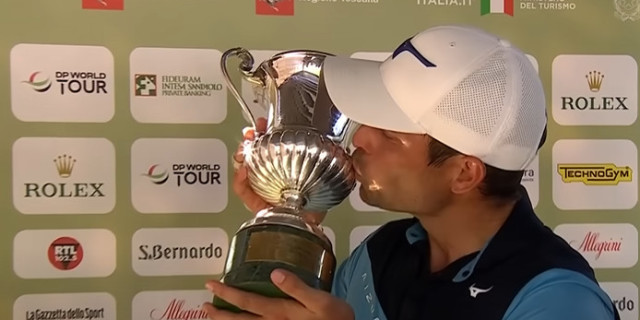
Golfers Who Fell Off A Cliff
Post by Sports Writer Derek Clements
One minute you are riding the crest of a wave, winning golf tournaments for fun and earning millions of pounds, dollars or yen. The next, it has all gone. Sometimes injury can be blamed. Other times it is because you have tried to alter a winning golf swing (why do they do that?). Most mysteriously of all, however, the magic can vanish into thin air for no apparent reason. And it doesn't matter how good you have been. Here, we look at some seriously good players who lost the plot.
TIGER WOODS
Featured Content
We never thought we would live to see the day that Tiger Woods would struggle so badly with his game that he would take a break from tournament golf, but as he tries to bed in swing changes and recovery from injury, that is precisely what has happened in more recent years. And it may never come back. As good as Woods' swing now looks, it isn't his. It is more than eight years since he won his last major, and the past three seasons have been a write-off after a succession of worst-ever scores and missed cuts, culminating in two back operations. His world ranking has plummeted and many think his game will never fully recover.

PADRAIG HARRINGTON
Harrington won three majors in less than 14 months, the last of which was the 2008 US PGA Championship – coincidentally, the same year that Woods won the last of his majors. For reasons that probably even Harrington now doesn't understand, he decided that he should change his swing. That would be the swing that had won him 11 regular European Tour events, two PGA Tour titles and three majors. His star fell so far that he didn't even make the field for The Masters or US Open in 2014. And then, from nowhere, he won the Honda Classic in 2015, before securing victory in the Portugal Masters earlier this year.
MATTEO MANASSERO
The Italian made the cut at The Open and at The Masters when he was just 16. He turned pro in 2010 and before the year was out had become the youngest winner of a European Tour event – he was just 17 when he took the Costello Masters title. He won the Malaysian Open the next year (the youngest two-time winner) and the Singapore Open in 2012, becoming the first teenager to win three times on tour. In 2013, he won the BMW PGA championship and entered the top 30 in the world rankings. Then he decided he needed to learn to hit the ball further and missed seven cuts in 2014. He didn't win a single euro in the first five tournaments of 2015 and his world ranking has fallen - and kept on falling. However, he had shown signs of life this year, most notably finishing in a tie for third at the Scottish Open.

SANDY LYLE
The Scot won The Open in 1985 and The Masters three years later. His swing was not a thing of beauty but it worked. In fact, Lyle may well have been one of the most natural talents European golf has ever produced. But he got it into his head that he needed to change the swing he had been born with and he quickly lost his game completely. He would be seen at practice grounds around the world with various contraptions attached to different parts of his body. And the harder he tried, the worse he became. Lyle won the Volvo Masters in 1992. He didn't win again until the ISPS Handa Senior World Championship in 2011.
SEVE BALLESTEROS
The Spaniard was probably the most natural, most instinctive player the game of golf has ever seen. Ballesteros was as close as golf has ever had to a genius. While there has always been a mechanical feel about Tiger Woods, Seve played by feel. At his best he was almost unbeatable, especially when it came to playing from trouble or anywhere within 120 yards of the green. He hit a lot of wild drives, so he had to learn how to master recovery shots. There were shots from car parks, from under trees, between trees, over swimming pools. You name it, and Seve could escape from it. And then, all of a sudden, he lost it. His drives became ever wilder, his scores climbed until, eventually, he became a figure of pity. It was actually a relief when, shortly after reaching the age of 50 and becoming eligible to play on both the Champions and European Seniors Tours, he announced that enough was enough.
IAN BAKER-FINCH
Baker-Finch won the PGA Tour Colonial and finished 16th on the money list in 1990. And in 1991 he won The Open thanks to final rounds of 64 and 66. He had threatened to join the elite for some time and his victory in The Open was the culmination of all that promise. He added victories in Australia, but never again after 1993. By 1994 Baker-Finch's game was in serious decline. There had been injuries and swing changes, but the Australian later admitted his problems were between the ears. At the 1995 Open at St Andrews, he snap-hooked his opening drive out of bounds across a fairway that is 100 yards wide. And there was worse to come. In 1997 he played in The Open at Troon and suffered the humiliation of an opening round of 92. It was the final straw. He withdrew and announced his retirement.
DAVID DUVAL
Was there ever a more spectacular fall? During the period from 1997 until 2001, Duval was ranked first or second in the world and seemed destined for a decade-long battle with Tiger Woods. He won 13 times during that time, including the Players Championship, a final round 59 to win the Bob Hope Classic, and the 2001 Open at Royal Lytham. His last victory came in the 2001 Dunlop Phoenix tournament in Japan. He then suffered back problems and missed 38 cuts from 2003-05. There were a couple of near-misses, including the 2009 US Open, where he finished second, but it was a false dawn. He has now all but retired and turned to broadcasting.

BILL ROGERS
Rogers was arguably the best player on the planet in 1981 when he won The Open, four tournaments on the PGA Tour and two other events for good measure. He struggled in 1982 but won again the following year. By 1988 he was done and dusted with golf. After 1983 Rogers had only two more Top 10 finishes. His money list finishes from 1984-88 were 134th, 128th, 131st, 174th and 249th. He made six of 18 cuts in 1985 and three of 15 in 1988 and then walked away from the game. He blamed burn-out – after his stellar 1981 he went all over the world chasing appearance fees, made a fortune but ran out of steam and fell out of love with golf.
YANI TSENG
When Tseng won the 2011 Women's British Open it was her fifth major victory at the age of just 22. She was the youngest golfer – man or woman – to win five majors. She won three times early in 2012 but then started to struggle. In 2013 she finished the season 38th on the LPGA Tour money list and in 2014 she was 54th. In 2013-14, Tseng had twice as many missed cuts as Top 10 finishes. She began to rack up the odd score in the high 70s and even failed to break 80 a few times. She has said that she was never comfortable in the spotlight and felt the pressure of being No 1 in the world. A few bad results came along and she lost her confidence, and still hasn't rediscovered it. Golf, as they say, is a funny old game.

Be part of the action with a selection of unique golf tournament experiences, from playing in a pro-am with the stars to watching the action at golf’s most illustrious events. Whether it’s the Masters or The Open, The Ryder Cup or WM Phoenix Open, build your own bespoke package with the experts at Golfbreaks.com.
Tags: tiger woods Seve Ballesteros PGA Tour









